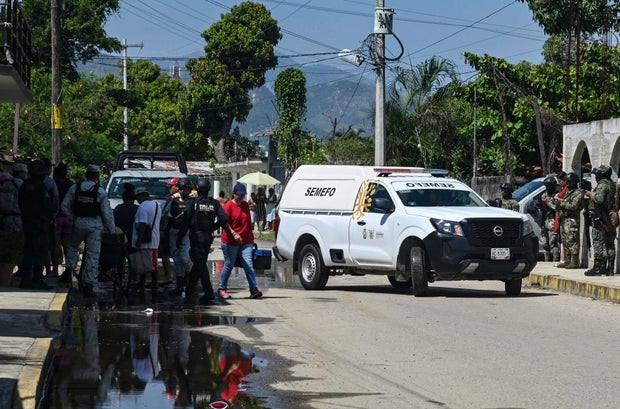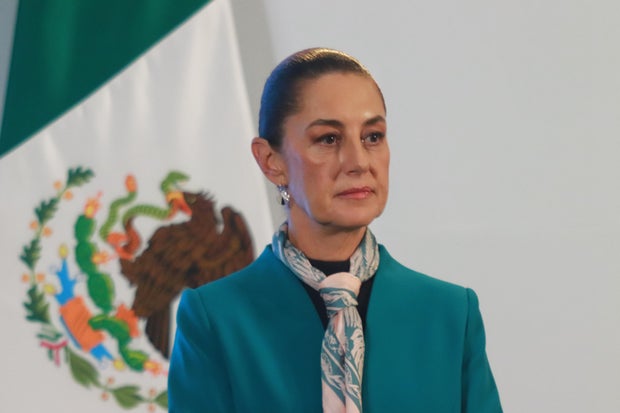10 bodies found in Mexico amid cartel violence
Police in a southern Mexico region rife with drug cartel violence have found 11 bodies, including two of minors, dumped by a highway, prosecutors in the state of Guerrero said Thursday.
The bodies were found late Wednesday after police received a tip about an abandoned pickup truck on the main thoroughfare of the city of Chilpancingo, the state capital, prosecutors said in a news release. The city of 300,000 has been the scene of gruesome drug gang violence as two rival cartels fight for control of the area.
Prosecutors did not specify the ages of the two dead minors but said that two of the 11 bodies were female. The highway where they were found is also the main route between Mexico City and the resort of Acapulco.
In early October, the city's mayor was killed and beheaded just a week after he took office. Alejandro Arcos took office on Oct. 1 in Chilpancingo, and his beheaded body was found in a pickup truck a week later, his head placed on the vehicle's roof. Days later, four mayors asked federal authorities for protection.
Arcos' murder came days after the killing of another city official, Francisco Tapia, according to Institutional Revolutionary Party president Alejandro Moreno.
"They had been in office for less than a week. Young and honest officials who sought progress for their community," Moreno said on X.
Two rival drug gangs, known as the Tlacos and the Ardillos, are fighting for control of the drug and extortion business in the city.
In 2023, gang violence in Chilpancingo became so brazen that one of the gangs staged a demonstration of hundreds of people, hijacked a government armored car, blocked a major highway and took police hostage to win the release of arrested suspects.
On Monday, officials said gunmen killed five members of the same family in a house in a suburb of Acapulco, which is in the state of Guerrero.
 A vehicle from the Forensic Medical Service (SEMEFO) is seen outside the house of a family that was shot by an armed commando in the town of Tres Palos in Acapulco, Guerrero state, Mexico, on November 4, 2024.
FRANCISCO ROBLES/AFP via Getty Images
A vehicle from the Forensic Medical Service (SEMEFO) is seen outside the house of a family that was shot by an armed commando in the town of Tres Palos in Acapulco, Guerrero state, Mexico, on November 4, 2024.
FRANCISCO ROBLES/AFP via Getty Images
Violence in Guerrero reached such unprecedented levels that earlier this year, Roman Catholic bishops announced they had helped arrange a truce in another part of the state between two warring drug cartels.
At the time, former president Andrés Manuel López Obrador- who refused to confront the gangs - said he approved such talks.
"Priests and pastors and members of all the churches have participated, helped in pacifying the country. I think it is very good," said López Obrador, who left office Sept. 30.
Mexico appears to abandon "hugs, not bullets" strategy
For the last six years, Mexico bragged about its oft-questioned "hugs, not bullets" strategy, in which its leaders avoided confrontations with drug cartels that were gradually taking control of large parts of the country. The thinking was that social programs, not shootouts, would gradually drain the pool of cartel gunmen.
Now, a month into the term of new President Claudia Sheinbaum, a string of bloody confrontations suggests the government is quietly abandoning the "no bullets" part of that strategy and is much more willing to use the full force of the military and the militarized National Guard.
But the challenge Mexico now faces is different from that during the country's 2006-2012 drug war. Cartels today are more diversified, more deeply entrenched in migrant smuggling and more willing to use foreign recruits and adolescents to fill their ranks.
All of that has led to a string of violent clashes in which security forces who shoot at suspected drug cartel convoys wind up killing bystanders and migrants, and reporting lopsided death tolls in which soldiers aren't harmed but most of the suspects are wiped out.
Sheinbaum has studiously avoided using the "hugs, not bullets" slogan popularized by her predecessor and mentor, López Obrador. She has, after all, pledged to continue each and every one of López Obrador's policies. Her office did not respond to a request for comment.
 Claudia Sheinbaum Pardo, president of Mexico, speaks during a news conference about the victory of Donald Trump as the 47th President of United States, on Nov. 6, 2024.
Carlos Santiago/ Pixelnews/Future Publishing via Getty Images
Claudia Sheinbaum Pardo, president of Mexico, speaks during a news conference about the victory of Donald Trump as the 47th President of United States, on Nov. 6, 2024.
Carlos Santiago/ Pixelnews/Future Publishing via Getty Images
But Sheinbaum has had to perform some verbal gymnastics to avoid disowning the policy entirely.
"Clearly, it isn't a question of hugs for criminals, nobody has ever said that," Sheinbaum said soon after taking office. The hugs, she said, were meant for impoverished youths, to avoid having them recruited as cartel gunmen.
"There are traces of a change in tone toward organized crime, but it's too early to call," said Falko Ernst, a security analyst. "It seems unlikely that the Sheinbaum administration would risk a politically inconvenient, steady stream of violent imagery by betting on wholesale balazos (bullets)-only strategy," but there may be more willingness to confront "the most overt and brazen displays of power" by the cartels.











 English (US) ·
English (US) ·